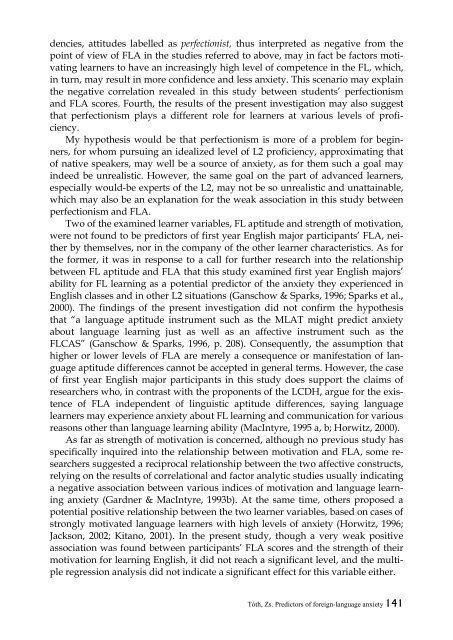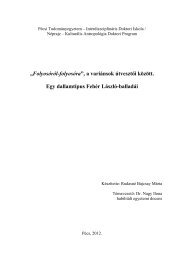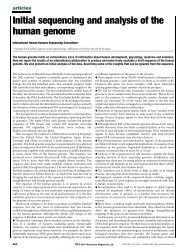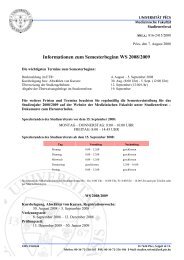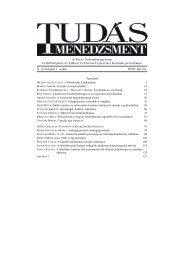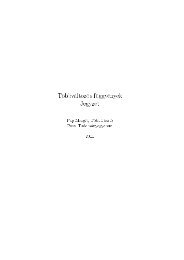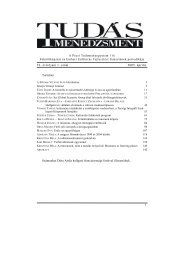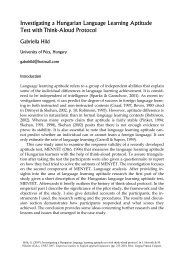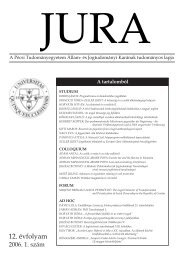Predictors of Foreign-Language Anxiety: Examining the ...
Predictors of Foreign-Language Anxiety: Examining the ...
Predictors of Foreign-Language Anxiety: Examining the ...
You also want an ePaper? Increase the reach of your titles
YUMPU automatically turns print PDFs into web optimized ePapers that Google loves.
dencies, attitudes labelled as perfectionist, thus interpreted as negative from <strong>the</strong>point <strong>of</strong> view <strong>of</strong> FLA in <strong>the</strong> studies referred to above, may in fact be factors motivatinglearners to have an increasingly high level <strong>of</strong> competence in <strong>the</strong> FL, which,in turn, may result in more confidence and less anxiety. This scenario may explain<strong>the</strong> negative correlation revealed in this study between students’ perfectionismand FLA scores. Fourth, <strong>the</strong> results <strong>of</strong> <strong>the</strong> present investigation may also suggestthat perfectionism plays a different role for learners at various levels <strong>of</strong> pr<strong>of</strong>iciency.My hypo<strong>the</strong>sis would be that perfectionism is more <strong>of</strong> a problem for beginners,for whom pursuing an idealized level <strong>of</strong> L2 pr<strong>of</strong>iciency, approximating that<strong>of</strong> native speakers, may well be a source <strong>of</strong> anxiety, as for <strong>the</strong>m such a goal mayindeed be unrealistic. However, <strong>the</strong> same goal on <strong>the</strong> part <strong>of</strong> advanced learners,especially would-be experts <strong>of</strong> <strong>the</strong> L2, may not be so unrealistic and unattainable,which may also be an explanation for <strong>the</strong> weak association in this study betweenperfectionism and FLA.Two <strong>of</strong> <strong>the</strong> examined learner variables, FL aptitude and strength <strong>of</strong> motivation,were not found to be predictors <strong>of</strong> first year English major participants’ FLA, nei<strong>the</strong>rby <strong>the</strong>mselves, nor in <strong>the</strong> company <strong>of</strong> <strong>the</strong> o<strong>the</strong>r learner characteristics. As for<strong>the</strong> former, it was in response to a call for fur<strong>the</strong>r research into <strong>the</strong> relationshipbetween FL aptitude and FLA that this study examined first year English majors’ability for FL learning as a potential predictor <strong>of</strong> <strong>the</strong> anxiety <strong>the</strong>y experienced inEnglish classes and in o<strong>the</strong>r L2 situations (Ganschow & Sparks, 1996; Sparks et al.,2000). The findings <strong>of</strong> <strong>the</strong> present investigation did not confirm <strong>the</strong> hypo<strong>the</strong>sisthat “a language aptitude instrument such as <strong>the</strong> MLAT might predict anxietyabout language learning just as well as an affective instrument such as <strong>the</strong>FLCAS” (Ganschow & Sparks, 1996, p. 208). Consequently, <strong>the</strong> assumption thathigher or lower levels <strong>of</strong> FLA are merely a consequence or manifestation <strong>of</strong> languageaptitude differences cannot be accepted in general terms. However, <strong>the</strong> case<strong>of</strong> first year English major participants in this study does support <strong>the</strong> claims <strong>of</strong>researchers who, in contrast with <strong>the</strong> proponents <strong>of</strong> <strong>the</strong> LCDH, argue for <strong>the</strong> existence<strong>of</strong> FLA independent <strong>of</strong> linguistic aptitude differences, saying languagelearners may experience anxiety about FL learning and communication for variousreasons o<strong>the</strong>r than language learning ability (MacIntyre, 1995 a, b; Horwitz, 2000).As far as strength <strong>of</strong> motivation is concerned, although no previous study hasspecifically inquired into <strong>the</strong> relationship between motivation and FLA, some researcherssuggested a reciprocal relationship between <strong>the</strong> two affective constructs,relying on <strong>the</strong> results <strong>of</strong> correlational and factor analytic studies usually indicatinga negative association between various indices <strong>of</strong> motivation and language learninganxiety (Gardner & MacIntyre, 1993b). At <strong>the</strong> same time, o<strong>the</strong>rs proposed apotential positive relationship between <strong>the</strong> two learner variables, based on cases <strong>of</strong>strongly motivated language learners with high levels <strong>of</strong> anxiety (Horwitz, 1996;Jackson, 2002; Kitano, 2001). In <strong>the</strong> present study, though a very weak positiveassociation was found between participants’ FLA scores and <strong>the</strong> strength <strong>of</strong> <strong>the</strong>irmotivation for learning English, it did not reach a significant level, and <strong>the</strong> multipleregression analysis did not indicate a significant effect for this variable ei<strong>the</strong>r.Tóth, Zs. <strong>Predictors</strong> <strong>of</strong> foreign-language anxiety 141


